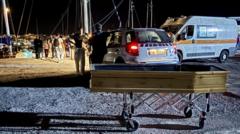The Italian government has officially sanctioned a groundbreaking €13.5 billion ($15.6 billion) suspension bridge project that promises to be the longest of its kind globally, linking the island of Sicily to Calabria, the southern region of mainland Italy. This structure, spanning 3.3 kilometers (2.05 miles) over the seismically active Messina Strait, is touted to endure earthquakes, reflecting the government's commitment to enhancing national infrastructure.
The approval marks a fresh chapter in a long history of abandoned proposals surrounding the Messina Bridge, a project that has faced scrutiny concerning costs, potential environmental impact, and concerns related to organized crime. Prime Minister Giorgia Meloni acknowledged the complexity of the project but framed it as vital for Italy's economic future. She insisted that confronting challenges that yield significant benefits is essential, stating, "We enjoy difficult challenges when they make sense."
The project design includes two 400-meter (1,300 feet) high towers, flanking two railway lines at the center with three traffic lanes on either side. A strategic move by the Italian government aims to categorize the bridge's funding as military expenditure, aiming to meet NATO’s 5% GDP defense spending commitment. Transport Minister Matteo Salvini heralded the bridge as a catalyst for regional economic upswing, estimating it will generate approximately 120,000 jobs annually in an area that grapples with high poverty levels.
However, critical voices against the bridge remain vocal. The project awaits final endorsements from the Italian Court of Auditors and essential environmental assessments, both nationally and within the EU. Local residents whose properties are at risk of compulsory acquisition could legally contest the initiative, potentially stalling the construction.
Senator Nicola Irto of the opposition Democratic Party criticized the project, labeling it "controversial and divisive," and cautioned against diverting resources from pressing local needs such as improved transportation and healthcare. Concerns regarding the operational implications for water usage, amid ongoing drought issues in the regions, have been emphasized by local opposition groups, including the grassroots organization "No to the Bridge," which argues that the decision reflects political expediency rather than rigorous technical assessment.
Currently, train transit between Sicily and Calabria relies on ferries, with a 30-minute crossing time. As Italy stands at a crossroads with this monumental infrastructure initiative, the potential impact on local communities, economy, and environment presents multifaceted challenges that the government must navigate carefully.
The approval marks a fresh chapter in a long history of abandoned proposals surrounding the Messina Bridge, a project that has faced scrutiny concerning costs, potential environmental impact, and concerns related to organized crime. Prime Minister Giorgia Meloni acknowledged the complexity of the project but framed it as vital for Italy's economic future. She insisted that confronting challenges that yield significant benefits is essential, stating, "We enjoy difficult challenges when they make sense."
The project design includes two 400-meter (1,300 feet) high towers, flanking two railway lines at the center with three traffic lanes on either side. A strategic move by the Italian government aims to categorize the bridge's funding as military expenditure, aiming to meet NATO’s 5% GDP defense spending commitment. Transport Minister Matteo Salvini heralded the bridge as a catalyst for regional economic upswing, estimating it will generate approximately 120,000 jobs annually in an area that grapples with high poverty levels.
However, critical voices against the bridge remain vocal. The project awaits final endorsements from the Italian Court of Auditors and essential environmental assessments, both nationally and within the EU. Local residents whose properties are at risk of compulsory acquisition could legally contest the initiative, potentially stalling the construction.
Senator Nicola Irto of the opposition Democratic Party criticized the project, labeling it "controversial and divisive," and cautioned against diverting resources from pressing local needs such as improved transportation and healthcare. Concerns regarding the operational implications for water usage, amid ongoing drought issues in the regions, have been emphasized by local opposition groups, including the grassroots organization "No to the Bridge," which argues that the decision reflects political expediency rather than rigorous technical assessment.
Currently, train transit between Sicily and Calabria relies on ferries, with a 30-minute crossing time. As Italy stands at a crossroads with this monumental infrastructure initiative, the potential impact on local communities, economy, and environment presents multifaceted challenges that the government must navigate carefully.





















